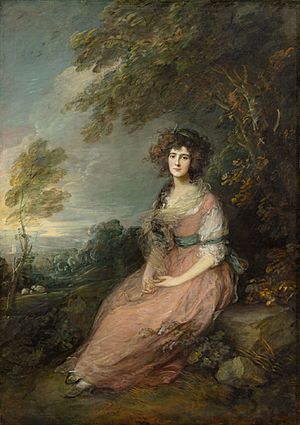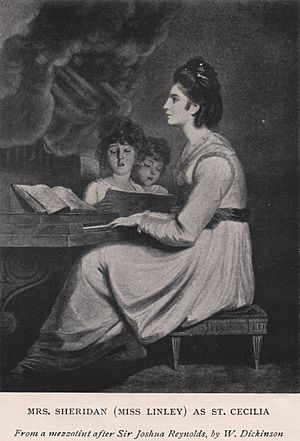Richard Brinsley Sheridan facts for kids
Quick facts for kids
Richard Brinsley Sheridan
|
|
|---|---|
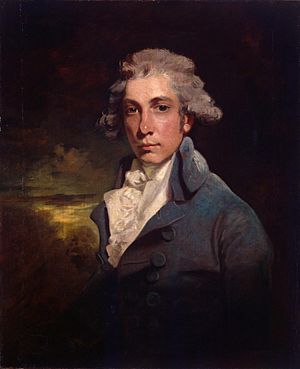
Portrait by John Hoppner, c. 1788-92
|
|
| Treasurer of the Navy | |
| In office 1806–1807 |
|
| Monarch | George III |
| Prime Minister | Lord Grenville |
| Preceded by | George Canning |
| Succeeded by | George Rose |
| Personal details | |
| Born | 30 October 1751 Dublin, Ireland |
| Died | 7 July 1816 (aged 64) London, England |
| Political party | Whig |
| Spouses | Elizabeth Ann Linley, Esther Jane Ogle |
| Profession | Playwright, politician |
Richard Brinsley Butler Sheridan (born October 30, 1751 – died July 7, 1816) was a famous Irish playwright, writer, and politician. He was a member of the Whig political party. He served in the British Parliament from 1780 to 1812.
Sheridan owned the Theatre Royal, Drury Lane in London. He wrote many well-known plays. Some of his most famous works include The Rivals (1775), The Duenna (1775), and The School for Scandal (1777). He also worked for the government as Treasurer of the Navy from 1806 to 1807. After he passed away in 1816, he was buried in Poets' Corner at Westminster Abbey. His plays are still very important in English literature and are performed all over the world.
Contents
Early Life and Family
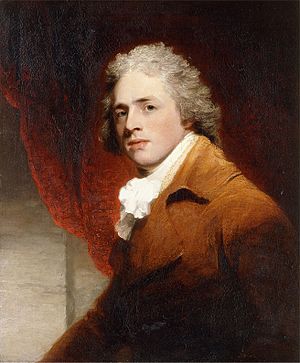
Richard Sheridan was born in 1751 in Dublin, Ireland. His family lived on a popular street called Dorset Street. His mother, Frances Sheridan, was a playwright and novelist. She wrote plays that were performed in London. She was also known for her novel The Memoirs of Miss Sidney Biddulph.
His father, Thomas Sheridan, was an actor and managed a theatre in Dublin. Later, he moved to England in 1758. He stopped acting and wrote books about education. He was especially interested in making the English language standard in schools.
When Richard was young, he went to the English Grammar School in Dublin. In 1758, when he was seven, his family moved to England for good. He went to Harrow School from 1762 to 1768. After school, his father hired a tutor, Lewis Ker, to teach him at home in London. He also learned fencing and horse riding from Domenico Angelo.
In 1772, when Richard was about 20 or 21, he had two duels with Captain Thomas Mathews. This happened because Mathews wrote a newspaper article that insulted Elizabeth Ann Linley. Richard wanted to marry Elizabeth. In the first duel, Mathews lost his sword and had to say sorry. But Mathews was angry about the public apology. He challenged Richard to another duel. The second duel was much more serious. Both men were hurt, and Richard was badly wounded. Luckily, he recovered.
Later that year, Elizabeth and Richard got married. They moved to London and lived a fancy lifestyle. Richard didn't have much money at first. They became part of the fashionable society and often entertained guests.
Becoming a Playwright
In 1775, Richard Sheridan's first play, The Rivals, was shown in London. At first, it wasn't a success. But Sheridan rewrote parts of it and showed it again a few days later. This time, it was a huge hit! It made him famous as a young playwright. The play is now a classic in English literature.
Soon after The Rivals, Sheridan worked with his father-in-law, Thomas Linley the Elder, who was a composer. They created an opera called The Duenna. This opera was also very popular and was performed many times.
His most famous play, The School for Scandal, first appeared on May 8, 1777. It is known as one of the best "comedies of manners" in English. A comedy of manners is a play that makes fun of the customs and behaviors of a particular social group, often the upper class. After this, he wrote The Critic in 1779. This play made fun of other plays and writers of the time.
Sheridan quickly became famous and earned a lot of money. In 1776, he bought a share in the Theatre Royal, Drury Lane. By 1778, he owned the whole theatre. All his later plays were performed there. In 1778, he wrote The Camp, which was about the fear of a French invasion of Britain.
On February 24, 1809, the Drury Lane Theatre burned down. When someone saw Sheridan watching the fire with a glass of wine, he famously said, "A man may surely be allowed to take a glass of wine by his own fireside." Sheridan managed the theatre for many years.
Political Career
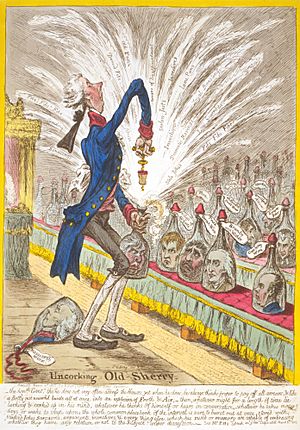
In 1780, Sheridan became a member of the House of Commons, which is part of the British Parliament. He supported Charles James Fox and the American Colonials in a big political discussion. Some people said he paid people to vote for him. Because of this, his first speech in Parliament was to defend himself against the charge of bribery.
In 1787, Sheridan asked for the impeachment of Warren Hastings. Hastings was the first Governor-General of India. Sheridan's speech in Parliament was considered one of the greatest speeches ever given.
In 1793, during a debate about a law to stop French spies from entering Britain, another politician, Edmund Burke, threw a knife on the floor to make a point. Sheridan quickly joked, "Where's the fork?" This made many people in the House of Commons laugh.
During the time when Britain was worried about a French invasion (1803–1805), Sheridan wrote a message to the people. He encouraged them to fight for their country, their homes, and their king. He said that the British people loved their king and their laws, and they did not want the changes that the invaders would bring.
He held government jobs, including Receiver-General of the Duchy of Cornwall (1804–1807) and Treasurer of the Navy (1806–1807). Sheridan was also close to the Prince of Wales (who later became King George IV).
After 32 years in Parliament, he lost his re-election in 1812. He faced financial difficulties in his last years. The American Congress heard about his money troubles and offered him £20,000. They did this to thank him for trying to prevent the American War of Independence. But he said no to the offer.
Death and Remembrance
In December 1815, Richard Sheridan became very sick. He died in 1816. Even though he had financial problems, many important people attended his funeral. These included dukes, earls, and the Lord Mayor of London. He was buried in the Poets' Corner of Westminster Abbey, a special place for famous writers.
In 1825, an Irish writer named Thomas Moore wrote a two-volume biography about Sheridan's life. This book helped shape how people remembered him. In 1881, a special blue plaque was put up in London to remember Sheridan. Another plaque is in Stafford.
Family Life
Richard Brinsley Sheridan was married twice. With his first wife, Elizabeth Ann Linley, he had a son:
- Thomas (Tom) Sheridan, who married Caroline Henrietta Callander. They had several children, including Helen Blackwood, Baroness Dufferin and Claneboye, Caroline Norton, and Georgiana Seymour, Duchess of Somerset.
In 1795, Richard B. Sheridan married Esther Jane Ogle (1776–1817). She was the daughter of the Dean of Winchester. They had at least one child: Charles Brinsley Sheridan (1796–1843).
Works
- The Rivals
- St Patrick's Day
- The Duenna
- A Trip to Scarborough
- The School for Scandal
- The Camp
- The Critic
- The Glorious First of June
- Pizarro
- Clio's Protest (written 1771, published 1819)
He also wrote poems and political speeches during his time in Parliament.
Images for kids
-
Physical Aid,—or—Britannia recover'd from a Trance;—also, the Patriotic Courage of Sherry Andrew; & a peep thro' the Fog (1803) by James Gillray, showing Sheridan defending Henry Addington and Lord Hawkesbury from French soldiers led by Napoleon.
See also
 In Spanish: Richard Brinsley Sheridan para niños
In Spanish: Richard Brinsley Sheridan para niños
 | Stephanie Wilson |
 | Charles Bolden |
 | Ronald McNair |
 | Frederick D. Gregory |


